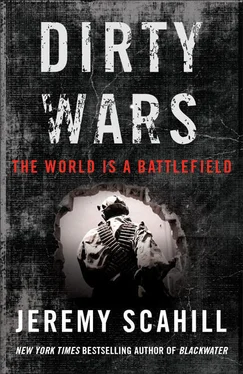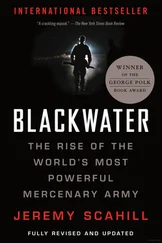Hunter told me that some of his colleagues began to question how they were being used. “There was a lot of trepidation on the part of people in that community about what we were being asked to do, and where, and for what purpose. A lot of it was of questionable legality, and most of it was outside of any stated battlefield,” he recalled. He also made clear there was a sizable community of JSOC operators and support staff who “truly believed” in Rumsfeld and Cheney’s vision “and were completely aware of the extralegal nature of the operations themselves, and were content with that and believed that they had been provided top cover from the office of the Secretary of Defense, and ultimately the White House.” JSOC “guys are like wolf packs at the tip of the spear doing what some believe is God’s work and some believe is America’s work,” he said. Rumsfeld and Cheney, he said, “would intentionally sidestep the Agency and go to Joint Special Operations Command with a set of mission parameters and goals and policy objectives that they wanted to meet for their own political purposes.”
When I asked him what operations he found most objectionable, Hunter was quick in his response: “Utilizing Special Operations Forces to spy without the knowledge of the State Department or the Central Intelligence Agency; using Special Operations Forces to go in and capture or kill people who were supposedly linked to extremist organizations around the world, in some cases allied countries.” He described operations conducted by JSOC in scores of countries, beyond Iraq and Afghanistan. Among them: Somalia, Algeria, the Philippines, Indonesia, Pakistan, Thailand, Mali, Yemen, Colombia, Peru, as well as various European and Central Asian countries. Across the globe, he said, JSOC was being used to conduct “kinetic operations—whether it’s capture or kill, in some cases to detain people—as directed.”
“Who were the people that would be targeted for killing?” I asked.
“People that were either linked to an extremist organization, or they were suspected of being affiliated with an extremist organization. Or they were people that were providing safe harbor or funding,” he told me.
“What type of intelligence would be necessary to say, ‘We’ve got a green light’” to conduct a targeted kill operation outside of a declared battlefield?
“Most of it was purely circumstantial,” he replied. “The majority of the operations were predicated on actionable intelligence, but not necessarily definitive intelligence. I think that’s the most worrisome aspect of the operations that transpired.”
The mindset, he said, was, “The world is a battlefield and we are at war. Therefore the military can go wherever they please and do whatever it is that they want to do, in order to achieve the national security objectives of whichever administration happens to be in power.”

18. The Imprisonment of Anwar Awlaki
YEMEN, 2004–2007—When Anwar Awlaki returned to Yemen in 2004, history was laying a path for him that would lead him toward international infamy and a showdown against JSOC, the CIA and the US assassination program. It seems unlikely he knew that at the time. How could he? His father, Nasser, said that Anwar’s decision to return to Sana’a was a practical one, not an indicator of his growing radicalism. “He could not get a scholarship to study in Britain,” Nasser asserted, so “he decided to come back to Yemen.” But what happened to Awlaki when he did return would harden his views toward US policies and propel him to renounce any allegiance he had once professed to hold to the country of his birth.
Awlaki arrived in Sana’a and was contemplating his next steps. He had plans to study at Iman University and was invited to preach at some mosques. In a lecture at Sana’a University, he delivered a speech on the role of Islam in the world and condemned the US war in Iraq. He and his wife and their children settled into Nasser’s home in Sana’a, just near the university. By that time, Awlaki’s eldest son, Abdulrahman, was nine years old. Like his father, he had spent the first years of his life growing up as an American. He was a lanky, bespectacled boy and the spitting image of his father at that age. Anwar “thought about creating a center of learning Islam and also language—teaching non-Muslims Arabic, and things like that,” recalled Nasser. “He thought about starting his own school, like an elementary school. He wanted to just do regular preaching, until he found some job which was appropriate for him.”
But the United States had not forgotten about Awlaki, and Yemeni intelligence agents were on him from the day he arrived. Awlaki had grown accustomed to life under surveillance, and he did his best to make a living. But religion—his faith—was his real passion. He spent a lot of time in front of the computer, recording sermons and carrying on extensive correspondence with his followers across the globe. “He was mostly doing lecturing, through the Internet,” said Nasser. “And also he got into trying to start some businesses, you know, real estate, some ventures. He was trying to work as a private person, buying and selling real estate.” Nasser laughed, shaking his head, before adding, “You know, but this didn’t work out.” Awlaki’s children were enjoying the time they spent with their grandparents, aunts and uncles, and the Awlakis began building a separate apartment for Anwar and his family inside their gated lot in Sana’a.
Awlaki’s family members describe this period in Sana’a as a time of exploration for Anwar. It seems clear that by 2006, Anwar had come to terms with the fact that his life as an American was over. The FBI was not going to leave him alone. The wars in Iraq and Afghanistan enraged him. He spent endless days and nights toiling over questions of how Muslims should respond to the wars, from Iraq, to Gaza, to Afghanistan and beyond. His sermons were becoming sharper. He often debated the nature of jihad with those he corresponded with. He truly seemed to be struggling to discover his own truths about the post-9/11 world. But Anwar did not mention al Qaeda, at least not in any positive way. “Everything was normal, and we thought that he put everything back [in America] behind him,” recalled Nasser. “And we were building our house, and we built him an apartment, and all that. So really, everything to me was very normal. And he himself was just only working on his preaching and things like that. And nothing else.”
Nothing else, until Anwar was put in prison.
“That was a turning point,” said Nasser.
ANWAR AWLAKI was a political prisoner. When he was arrested in mid-2006 by US-backed Yemeni forces, there was a cover story. Something about Anwar intervening in a tribal dispute. But, as with most political prisoners, it was just a thinly veiled excuse to take him off the streets. Anwar was taken at night and put in solitary confinement at the feared prison in Sana’a run by the PSO, the Political Security Organization. The PSO worked closely with US intelligence. After he was arrested, Yemeni intelligence agents confiscated his computer and tapes of lectures he had given at Iman University. There were never any real charges brought against him. Anwar swore that it was the US government that was keeping him locked up, so Nasser reached out to the US Embassy for help. He was their citizen, after all. Surely they knew Anwar, Nasser thought. He was the one on TV after 9/11. The “go-to imam.” A counselor at the embassy said he could offer little more than an assurance they would “look after” Anwar.
“For the first nine months, I was in solitary confinement in an underground cell. I would say that the cell was about 8 feet by 4,” Awlaki later recalled. “I was not allowed pen and paper, and no exercise whatsoever. I hadn’t seen the sun for the entire period.” He said he was allowed “no interaction at all with any person except with the prison guards.”
Читать дальше













